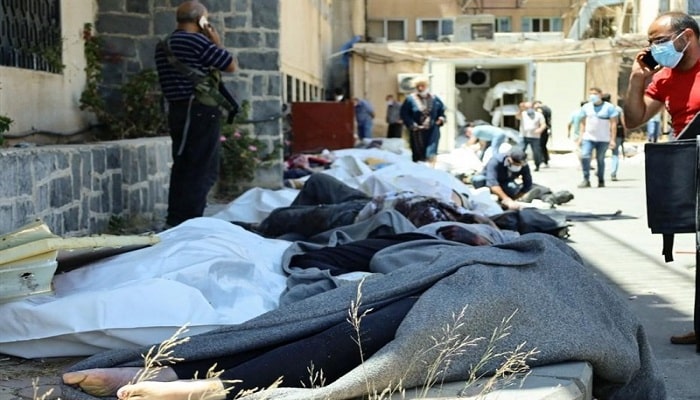PNN – Medical sources in Sweida province, referring to the catastrophic humanitarian situation in the province after the brutal attacks by terrorist elements affiliated with the Golani government, announced that we are in real chaos and that the accumulation of bodies in the hospital and on the streets is leading to severe pollution.
According to the report of Pakistan News Network, While tensions continue in the Druze-populated province of Sweida in southern Syria after the massive campaign by terrorists affiliated with the government of Abu Muhammad al-Julani last week and then the intervention of the Zionist regime to carry out its plots, local sources report a dire humanitarian situation in the province, especially in terms of health and medicine.
Water and electricity cuts and bodies piling up in hospitals and streets
According to these reports, public and private hospitals in Sweida province are struggling under the burden of last week’s bloody events amid water and electricity cuts, shortages of medical equipment and even the most basic vital medicines. In addition, hospitals are full of wounded and injured people, and a large number of bodies have piled up in hospitals, and some bodies are even left on the streets and sidewalks.
The medical and health situation in Sweida province has deteriorated sharply since the bloody attacks by the Golani elements began on July 13, and its environmental consequences threaten the people, especially those with serious injuries and chronic and incurable diseases.
Dr. Omar Adel Obaid, head of the Sweida Medical Association, announced in a telephone interview with Al-Arabi Al-Jadeed that the Sweida Central Hospital, known as the National Hospital, has borne the greatest pressure because it is the largest and best equipped hospital to accept emergency cases. But today, the hospital’s situation is very catastrophic due to the scale of casualties from the attack on the hospital and its occupation for a full day, which also resulted in the deaths and injuries of some medical personnel.
In addition, for about 6 days, bodies have been piling up in and around the hospital, causing severe pollution. This figure is separate from the victims and bodies left in the streets and houses, which we are unable to access. The situation is getting worse day by day, because each body becomes a source of pollution, especially since the killings have spread to all neighborhoods of the city of Sweida.
The catastrophic state of Sweida hospitals and the performance of surgeries without anesthesia
This medical official from Sweida province stated: Medical personnel at the National Hospital performed about 500 surgeries over 8 days, from treating chest and stomach injuries to amputations and injuries from shrapnel and gunshots. This is an unprecedented toll, and no hospital, no matter how well equipped, can handle it. The national hospital in Sweida has about 250 beds, but due to the scale of the casualties, not a single bed was left empty, and we had to prioritize the wounded, keeping those in the worst condition and releasing the rest.
He continued: There are several other government hospitals in Sweida province, including Salkhad Hospital, which has seventy beds, but it is not as well equipped as Sweida National Hospital and does not provide MRI and CT scan services. Also, only emergency cases are admitted to Shahba Hospital. Private hospitals are also very small, accommodating between 12 and 15 patients, and clinics are not logistically or even staffed to handle injuries in times of war.
The head of the Sweida Medical Association warned that the humanitarian situation in the province is very dire, and we have been without water and electricity for 15 full days, and the ability to pump water for drinking or personal hygiene has been greatly reduced. After the recent developments and the ongoing massacres, the situation of patients in Sweida has also worsened, and they cannot go to Damascus Hospital, which is the only government hospital for the treatment of chronic and incurable diseases.
Service interruption to Sweida Hospital under the shadow of the Golani government
He continued: Before the new conflicts, we were trying to provide medicines and chemotherapy services, but the Damascus-Suwayda road is full of dangers and terrorist gangs, and unfortunately, the Syrian Ministry of Health refused to provide us with these medicines.
Obaidah Abu Fakhr, one of the senior doctors at Sweida Hospital, also pointed out the depth of suffering and pain that existed in the hospital during the 10 days, saying: We performed a large number of surgeries, but due to the lack of empty operating rooms, we were unable to save the lives of some of the injured. We even had to operate on some of the injured and children without anesthesia, and some of the injured underwent minor surgeries in the hospital corridors. Due to a shortage of medical and nursing personnel, we were unable to properly care for patients, which led to infection of their wounds.

